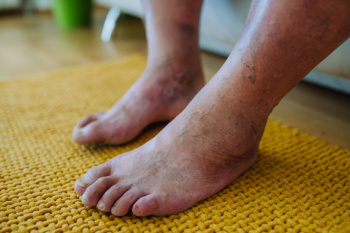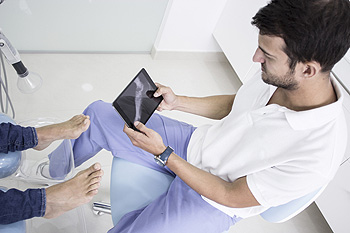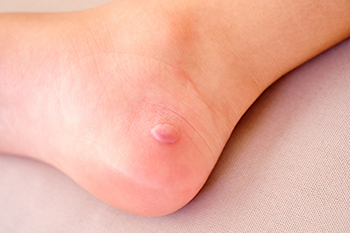Items filtered by date: March 2024
See Your Podiatrist Regularly If You Work On Your Feet
Preventing Falls and Protecting Home Safety With Smoke Alarms

Home safety is important for everyone, particularly the elderly and children who are more susceptible to falls. Taking proactive measures can significantly reduce the risk of accidents and falls within the household. One vital aspect of home safety is the installation and maintenance of smoke alarms. These devices serve as early warning systems, alerting occupants to the presence of smoke or fire and providing valuable time to evacuate safely. In addition to smoke alarms, several other measures can help prevent falls and enhance overall home safety. These include securing rugs and carpets to prevent tripping hazards, ensuring adequate lighting in hallways and staircases, and installing handrails in bathrooms and along staircases for added support. Clearing clutter and keeping walkways free from obstacles also contribute to a safer living environment. By prioritizing home safety and implementing preventive measures, individuals can protect their feet from the injuries that falling can cause. If you are seeking additional information about effective fall prevention techniques, it is suggested that you confer with a podiatrist.
Preventing falls among the elderly is very important. If you are older and have fallen or fear that you are prone to falling, consult with Brandon M. Zuklie, DPM from New Jersey. Our doctor will assess your condition and provide you with quality advice and care.
Every 11 seconds, an elderly American is being treated in an emergency room for a fall related injury. Falls are the leading cause of head and hip injuries for those 65 and older. Due to decreases in strength, balance, senses, and lack of awareness, elderly persons are very susceptible to falling. Thankfully, there are a number of things older persons can do to prevent falls.
How to Prevent Falls
Some effective methods that older persons can do to prevent falls include:
- Enrolling in strength and balance exercise program to increase balance and strength
- Periodically having your sight and hearing checked
- Discuss any medications you have with a doctor to see if it increases the risk of falling
- Clearing the house of falling hazards and installing devices like grab bars and railings
- Utilizing a walker or cane
- Wearing shoes that provide good support and cushioning
- Talking to family members about falling and increasing awareness
Falling can be a traumatic and embarrassing experience for elderly persons; this can make them less willing to leave the house, and less willing to talk to someone about their fears of falling. Doing such things, however, will increase the likelihood of tripping or losing one’s balance. Knowing the causes of falling and how to prevent them is the best way to mitigate the risk of serious injury.
If you have any questions, please feel free to contact our offices located in Piscataway, Jamesburg, and Branchburg, NJ . We offer the newest diagnostic and treatment technologies for all your foot care needs.
Foot Care for Diabetics

Promoting foot care among diabetes patients is imperative for preventing complications. Podiatrists are pivotal in educating patients on proper foot care practices. Emphasizing an understanding of how diabetes affects the feet, encouraging patients to monitor blood glucose, doing daily foot inspections, moisturizing, and wearing proper footwear helps prevent neuropathy-related injuries. Regular podiatric check-ups can detect neuropathy early, reducing the risk of foot ulcers. Podiatrists also educate on managing arthropathy, emphasizing foot alignment and orthotic use. Vasculopathy awareness involves promoting foot warmth and avoiding prolonged pressure to prevent ischemic ulcers. Patients must understand the importance of prompt wound care to prevent infections and amputations. Also, inspiring regular exercise and maintaining a healthy lifestyle supports overall foot health. If you are a diabetic and want to make sure your feet remain as healthy as possible, it is strongly suggested that you make regular appointments with a podiatrist for the education and treatment you need.
Diabetic foot care is important in preventing foot ailments such as ulcers. If you are suffering from diabetes or have any other concerns about your feet, contact Brandon M. Zuklie, DPM from New Jersey. Our doctor can provide the care you need to keep you pain-free and on your feet.
Diabetic Foot Care
Diabetes affects millions of people every year. The condition can damage blood vessels in many parts of the body, especially the feet. Because of this, taking care of your feet is essential if you have diabetes, and having a podiatrist help monitor your foot health is highly recommended.
The Importance of Caring for Your Feet
- Routinely inspect your feet for bruises or sores.
- Wear socks that fit your feet comfortably.
- Wear comfortable shoes that provide adequate support.
Patients with diabetes should have their doctor monitor their blood levels, as blood sugar levels play such a huge role in diabetic care. Monitoring these levels on a regular basis is highly advised.
It is always best to inform your healthcare professional of any concerns you may have regarding your feet, especially for diabetic patients. Early treatment and routine foot examinations are keys to maintaining proper health, especially because severe complications can arise if proper treatment is not applied.
If you have any questions please feel free to contact our offices located in Piscataway, Jamesburg, and Branchburg, NJ . We offer the newest diagnostic and treatment technologies for all your foot and ankle needs.
Education Requirements for Podiatrists

Becoming a podiatrist involves rigorous educational pursuits to equip individuals with the knowledge and skills necessary for foot and ankle care. Aspiring podiatrists typically embark on a journey that includes undergraduate studies, followed by enrollment in a Doctor of Podiatric Medicine, or DPM program, accredited by the Council on Podiatric Medical Education, abbreviated CPME. These programs, spanning four years, encompass coursework in anatomy, physiology, pharmacology, and podiatric medicine, supplemented by clinical rotations and hands-on training in podiatric clinics and hospitals. Upon completing the DPM program, aspiring podiatrists undertake postgraduate training through residency programs, where they gain specialized experience in podiatric surgery, wound care, sports medicine, and other facets of foot and ankle care. Obtaining state licensure requires successful completion of national and state board examinations, ensuring competency and adherence to professional standards. Continuous education and professional development are integral to the practice of podiatry, as practitioners stay abreast of advancements and best practices to deliver quality care to their patients. If you are interested in pursuing the field of podiatry, it is suggested that you speak to this type of doctor who can answer any questions or address any concerns you may have.
If you are experiencing pain in the feet or ankles, don’t join the stubborn majority refusing treatment. Feel free to contact Brandon M. Zuklie, DPM from New Jersey. Our doctor can provide the care you need to keep you pain-free and on your feet.
What Is a Podiatrist?
Someone would seek the care of a podiatrist if they have suffered a foot injury or have common foot ailments such as heal spurs, bunions, arch problems, deformities, ingrown toenails, corns, foot and ankle problems, etc.
Podiatric Treatment
A podiatrist will treat the problematic areas of the feet, ankle or lower leg by prescribing the following:
- Physical therapy
- Drugs
- Orthotic inserts or soles
- Surgery on lower extremity fractures
A common podiatric procedure a podiatrist will use is a scanner or force plate which will allow the podiatrist to know the designs of orthotics. Patients are then told to follow a series of tasks to complete the treatment. The computer will scan the foot a see which areas show weight distribution and pressure points. The podiatrist will read the analysis and then determine which treatment plans are available.
If you have any questions please feel free to contact our offices located in Piscataway, Jamesburg, and Branchburg, NJ . We offer the newest diagnostic and treatment technologies for all your foot and ankle needs.
Preventing Blisters on the Feet
 It is frustrating to experience foot blisters that keep coming back. Wearing well-fitted shoes and keeping the feet dry are two key prevention techniques for foot blisters. Choose breathable footwear to reduce friction and moisture, common culprits in blister formation. If you have a new pair of shoes, gradually break them in to help your feet adjust and minimize the risk of friction-related blisters. Moisture-wicking socks also help keep the feet dry, further reducing the likelihood of blister formation. Additionally, blister pads and petroleum jelly are friction-reducing products that can offer an added layer of protection from rubbing. Podiatrists, or foot doctors, can inspect your feet for any signs of irritation and address blister-related pain quickly. If you are experiencing foot blisters, it is suggested you make an appointment with a podiatrist who can offer further prevention tips.
It is frustrating to experience foot blisters that keep coming back. Wearing well-fitted shoes and keeping the feet dry are two key prevention techniques for foot blisters. Choose breathable footwear to reduce friction and moisture, common culprits in blister formation. If you have a new pair of shoes, gradually break them in to help your feet adjust and minimize the risk of friction-related blisters. Moisture-wicking socks also help keep the feet dry, further reducing the likelihood of blister formation. Additionally, blister pads and petroleum jelly are friction-reducing products that can offer an added layer of protection from rubbing. Podiatrists, or foot doctors, can inspect your feet for any signs of irritation and address blister-related pain quickly. If you are experiencing foot blisters, it is suggested you make an appointment with a podiatrist who can offer further prevention tips.
Blisters are prone to making everyday activities extremely uncomfortable. If your feet are hurting, contact Brandon M. Zuklie, DPM of New Jersey. Our doctor can provide the care you need to keep you pain-free and on your feet.
Foot Blisters
Foot blisters develop as a result of constantly wearing tight or ill-fitting footwear. This happens due to the constant rubbing from the shoe, which can often lead to pain.
What Are Foot Blisters?
A foot blister is a small fluid-filled pocket that forms on the upper-most layer of the skin. Blisters are filled with clear fluid and can lead to blood drainage or pus if the area becomes infected.
How Do Blisters Form?
Blisters on the feet are often the result of constant friction of skin and material, usually by shoe rubbing. Walking in sandals, boots, or shoes that don’t fit properly for long periods of time can result in a blister. Having consistent foot moisture and humidity can easily lead to blister formation.
Prevention & Treatment
It is important to properly care for the affected area in order to prevent infection and ease the pain. Do not lance the blister and use a Band-Aid to provide pain relief. Also, be sure to keep your feet dry and wear proper fitting shoes. If you see blood or pus in a blister, seek assistance from a podiatrist.
If you have any questions, please feel free to contact our offices located in Piscataway, Jamesburg, and Branchburg, NJ . We offer the newest diagnostic and treatment technologies for all your foot care needs.


